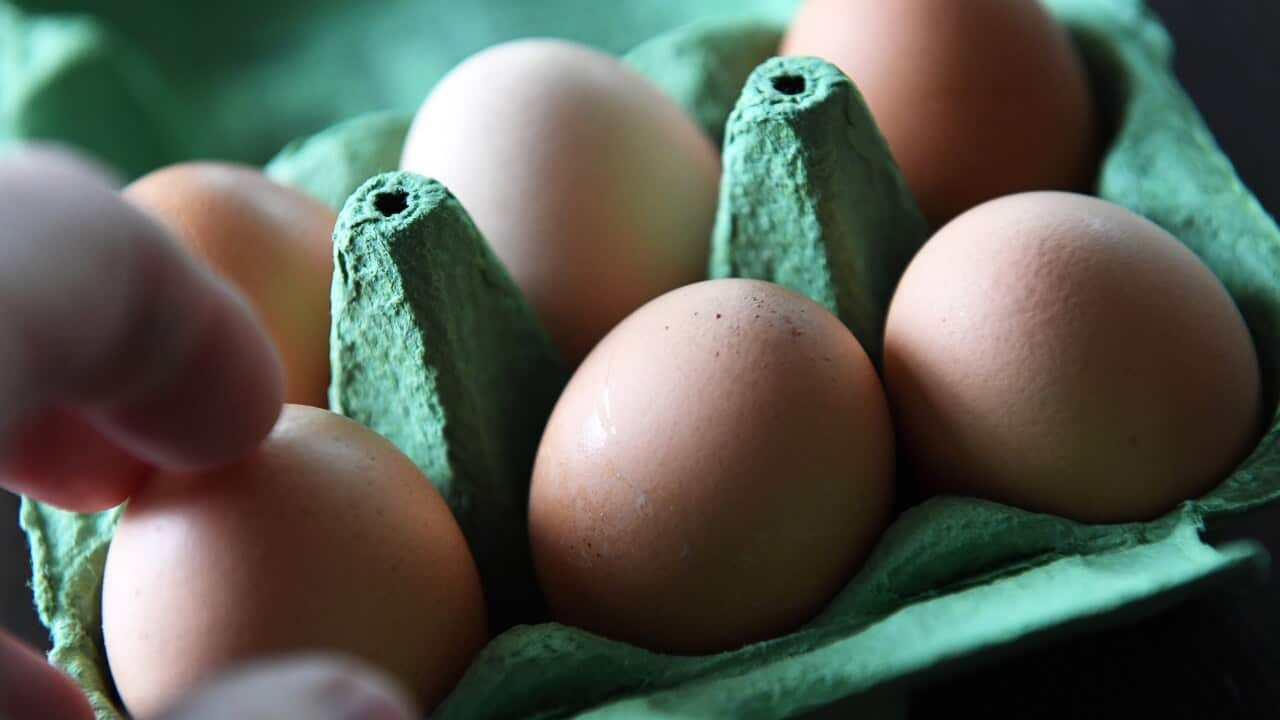Have you noticed empty egg shelves at your local supermarket recently? You're not alone.
Australian consumers are again pointing out shortages on some shelves as the major supermarkets continue to impose limits on eggs in a number of states.
Some social media users have weighed in, with one person saying on a recent Reddit post they struggled to find eggs from the major supermarkets for two weeks, but were successful at a local grocer.
Other users observed reduced egg sections at supermarkets, and said they're easier to find in some places more than others.

Empty egg shelves at a Coles store in Sydney earlier this month. Source: SBS News / Cecilia Lindgren
Murray has two free-range farms and operates mostly near the Melbourne area. He sells eggs in Woolworths and Coles, along with several independent stores.
"It seems to be something that is ongoing across Australia right now," he said.
Why is there an egg shortage?
According to Egg Farmers of Australia (EFA), which is the national representative body for farmers, there are several factors behind the current egg shortages, which are not new.
Farmers are continuing to bounce back from which impacted egg production on some sites in Victoria, NSW and the ACT. AI is also known as bird flu.
"The disease required laying flocks on infected farms to be destroyed," EFA chief executive Melinda Hashimoto said in a statement on 8 January.
"The good news is that the majority of farms impacted by AI have now restocked with new layer hens, and egg production on these properties is expected to gradually return to normal over the next six months."
Murray said it's important to remember that AI is "very much an ongoing challenge for these farms".
"There's the initial shock and difficulty that comes with, 'okay we have to clear this farm out, empty the shed and sit tight for a while'," he said, adding the process of returning to production has also been lengthy.
Meanwhile, Hashimoto said there has been high seasonal demand for eggs during the festive season, summer holidays and back-to-school period.
The industry is also facing a "transitional period" as some egg farms move from cage egg production to barn-laid or free-range systems.
This comes ahead of a phase-out of conventional caged eggs in many states by 2036, due to changes to Australia's animal welfare standards and guidelines for poultry.
"It takes time and capital expenditure to etablish new farming infrastructure," Hashimoto said.
Current conditions have meant Murray's operations are "spread more thin".
"We've been making tougher decisions ... how can we make sure we're where we need to be to make sure the stores are staying full and the customers are satisfied?
LISTEN TO

Shoppers urged to avoid panic as bird flu outbreak affects eggs
SBS News
10/06/202401:13
How are supermarkets responding?
As a result of last year's bird flu outbreak, all retailers and hospitality operators have been affected to some degree over the past six months.
However, Woolworths said its supply remains stable.
A spokesperson said the reduced number of laying hens in Australia "unfortunately will take a while longer to rebuild".
"In the meantime, the egg industry is working to boost supply marketwide," they told SBS News.
Woolworths continues to impose two-pack purchase limits on eggs in all states except Western Australia. Limits have been in place since last July.
Coles has been contacted for comment.
ALDI has seen a small decrease in supply but is working to manage stock levels. It does not have buying limits on eggs.
A spokesperson for IGA said its stores are independently owned and operated, meaning they can source products from various suppliers.
"To find out about the current availability of eggs, we recommend that shoppers check with their local store," they said.
Where should I look for eggs?
Hashimoto said Woolworths and Coles mostly stock barn-laid or free-range eggs, based on current policy.
"However, you will find plenty of eggs (both cage and other production methods) at your independent grocery stores or local fruit and vegetable outlets, that stock eggs," she said.
Murray said a lot of farms struggle to find a home for their "abnormal" or "tiny" eggs.
He encouraged consumers to go local if they can, by checking out farmers markets, grocers or butchers.
When will egg supply return to 'normal'?
The EFA expects egg production will increase throughout the course of this year and Hashimoto said "a greater supply will become available."
Murray believes conditions are improving and farms should repopulate over the course of this year. He hopes things will be "fairly close to normal" by mid-2025.











